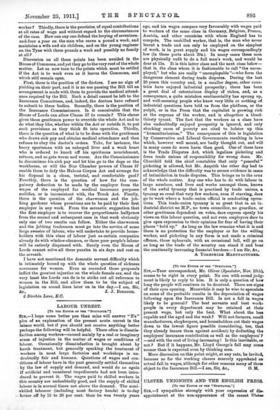LABOUR UNREST.
tTo THE EDITOR OF TEE "SPECTATOR."] SIR,—I hope some better pen than mine will answer " Z's" plea of an explanation of the present acute unrest in the labour world, but if you should not receive anything better perhaps the following will be helpful. There often is dissatis- faction among workers—caused mainly by a real or imaginary sense of injustice in the matter of wages or conditions of labour. Occasionally dissatisfaction is brought about by harsh treatment, but generally speaking the treatment of workers in most large factories and workshops is un- doubtedly fair and humane. Questions of wages and con- ditions of labour have in the past generally settled themselves by the law of supply and demand, and would do so again if artificial and unnatural impediments had not been intro- duced to prevent it. The wages paid to skilled workers in this country are undoubtedly good, and the supply of skilled labour is in normal times not above the demand. The semi- skilled labourer (including most factory hands) is to-day better off by 15 to 20 per cent. than be was twenty years ago, and his wages compare very favourably with wages paid to workers of the same class in Germany, Belgium, France, Austria, and other countries with whom England has to compete. The unskilled worker, that is, the man who never learnt a trade and can only be employed on the simplest of work, is in great supply and his wages correspondingly low (in these parts about 20s.). In many cases these men are physically unfit to do a full man's work, and would be dear at 15s. It is this latter class and the next class below— that is, the class whom it is fashionable to call "the unem- ployed," but who are really " unemployable "—who form the dangerous element during trade disputes. During the last 20 years this country and, in a smaller degree, other coun- tries have enjoyed industrial prosperity ; there has been a great deal of ostentatious display of riches, and, as a consequence, a quite mistaken sentimentality has sprung up, and well-meaning people who know very little or nothing of industrial questions have told us from the platform, or the pulpit, or in the Press that the capitalist is growing rich at the expense of the worker, and is altogether a blood- thirsty tyrant. The fact that the workers as a class have also undoubtedly enjoyed prosperity is ignored, and only shocking cases of poverty are cited to bolster up this " humanitarianism." The consequence of this is legislation by Conservative and Liberal Governments resulting in laws which, however well meant, are badly thought out, and will in many cases do more harm than good. One of these laws is the Trade Disputes Act, which legalizes picketing and frees trade unions of responsibility for wrong done. Mr. Churchill told the chief constables that only " peaceful " picketing is allowed, but Mr. Asquith the other day had to acknowledge that the difficulty was to secure evidence in cases of intimidation in trade disputes. This brings us to the crux of the whole matter. Any one who has to do with labour in large numbers, and lives and works amongst them, knows of the awful tyranny that is practised by trade unions, a tyranny so cruel that very few workers, even if starving, dare go to work where a trade- union official is conducting opera- tions. This trade-union tyranny is so great that in an in- dustrial district no M.P., no town councillor, no guardian, or other gentleman dependent on votes, dare express openly his views on this labour question, and not even employers dare to give open expression to their opinions for fear of having their places " held up." As long as the law remains what it is and there is no protection for the employer or for the willing worker, and picketing in any form is not made a criminal offence, these upheavals, with an occasional lull, will go on as long as the trade of the country can stand it and bear the continually increasing financial burdens.—I am Sir, &c., A YORKSHIRE MANUFACTURER*


















































 Previous page
Previous page